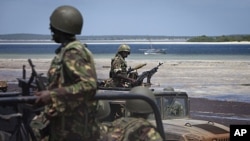Africa's top security official says the allied military offensive currently underway in Somalia is systematically destroying the al-Qaida linked militant group al-Shabab. The African Union is asking the United Nations to fund a final push aimed at crushing al-Shabab by August.
The African Union Thursday endorsed and sent to the U.N. Security Council a request to increase the strength of its AMISOM military mission in Somalia from 12,000 to 17,700 troops. The request includes funds for so-called “force multipliers”, such as helicopters and warships that would dramatically expand AMISOM's capabilities.
AU Peace and Security Commissioner Ramtane Lamamra says AMISOM needs the manpower and equipment to defeat Somalia's al-Shabab militants by August, when elections are scheduled to replace the U.N.-backed transitional government.
Al-Shabab controls large swaths of famine-stricken south and central Somalia. But a three-pronged offensive by Kenyan forces in the south, Ethiopian soldiers in the west, and AMISOM troops in Mogadishu to the north has the rebels on the run.
Lamamra says the militants' fighting capability has been sharply degraded.
"The Shabab as a military force is being systematically and steadily destroyed. They have been defeated in Mogadishu, they are now being defeated in the Gedo and Juba regions, same happened in Beledweyn a week ago," Lamamra said.
Reports from the region indicate al-Shabab is mobilizing a large force of conscripts and local volunteers to resist what they call a “foreign invasion”. But Lamamra dismisses the reports, calling them part of a Shabab disinformation campaign.
"That is propaganda, that is the way al-Shabab is trying to maintain together their forces. The reports we are receiving is that there are a very unusual level of desertions in the ranks of al-Shabab," Lamamra said.
Lamamra's optimism about the military campaign was undermined, however, by concerns about political instability. Fistfights broke out on the floor of Somalia's parliament Wednesday during a controversial election to replace the speaker of the house, and President Sheikh Sharif Ahmed declared the election null and void.
An AU Peace and Security Council communique Thursday called on Somali lawmakers to remain focused on the need for a functioning government to bring an end to more than two decades as a failed state.
Kenya's AU Ambassador Monica Juma, who heads the Peace and Security Council for January, called for international pressure to persuade Somali politicians to work together.
"In any political electioneering process anywhere in the world we see all sorts of wrangling, so it's not surprising that we are beginning to see conflict in parliament, people trying to jostle and position themselves. I think the responsibility of the international community is that we put enough pressure that the political process is not derailed," Juma siad.
The U.N. Security Council is expected to take up the request for strengthening AMISOM as early as next Wednesday.
Diplomats attending Thursday's AU meetings say the prompt U.N. response reflects an understanding of the urgency of ending two decades of anarchy in Somalia.
Secretary General Ban Ki-moon visited Mogadishu last month, the first visit by a U.N. chief to Somalia in nearly two decades.
AU: Somalia's al-Shabab Being 'Systematically Destroyed'




